Making every mouthful count: the importance of nutrition in aged care
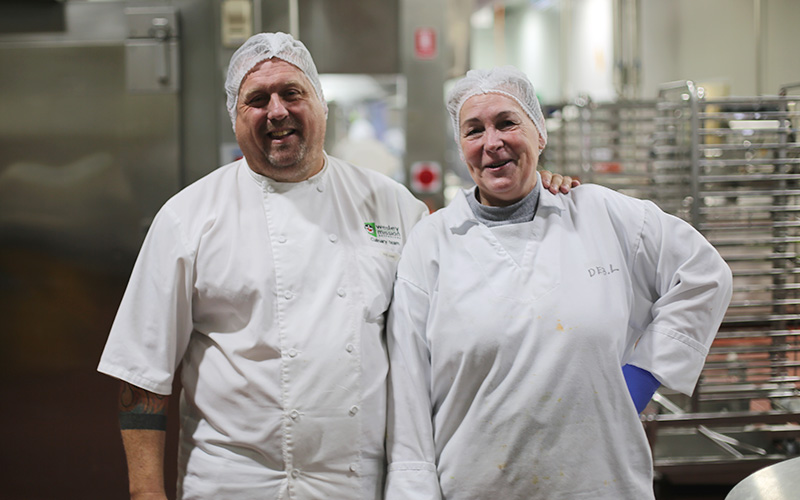
As we celebrate Seniors Month this October, we are putting a spotlight on the vital role nutrition plays in enhancing the health and wellbeing of older Australians.
The Royal Commission into Aged Care Quality and Safety recently revealed that 68% of residents in aged care facilities are malnourished or at risk of malnutrition. This highlights the urgent need for balanced and nutritious meals.
Nutrition: a cornerstone of effective aged care
At Wesley Mission Queensland (WMQ), we believe nutritious food is a cornerstone of effective aged care. It not only supports physical health and cognitive function but also fosters social connections among residents.
Prioritising balanced, enjoyable, and tailored food is key to supporting not only the health of individuals but also enriching their overall experience and quality of life.
Meet Russell Kearney, WMQ’s Dining Services Manager
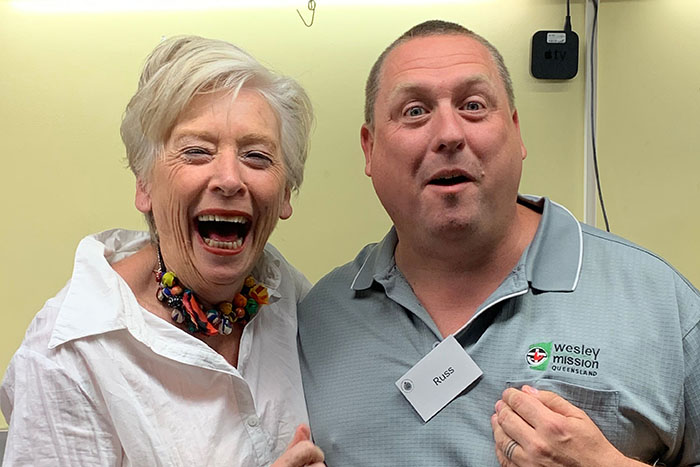
Image: WMQ’s Russell alongside Chef Maggie Beer at a Master Class on aged care nutrition.
Russell Kearney, Manager of WMQ Dining Services, brings over 30 years of experience as a chef to our kitchens. His philosophy is simple:
What would my nan want to eat?
‘Good nutrition in aged care is critical,’ he says. ‘I believe we need to make every mouthful count. Every mouthful someone eats in an aged care or retirement setting must have nutritional value because it greatly impacts wellbeing, the physical state, it’s unbelievable. If you get someone with the right diet, the right nutritional values, it extends their life expectancy. It helps them with their skin elasticity and the digestion of their medications.’
Supporting wellbeing through balanced meals
Another person who understands the importance of nutrition is Abby Manalo, a clinical nurse at WMQ Cooper House.
‘If the residents are receiving nutritious meals, they are happier knowing that can enjoy their food. When a resident has good nutrition, we avoid unplanned weight loss, avoid malnutrition and avoid increased frailty which helps them to stay mobile to attend daily activities and socialise with other residents.’
For Russell and his team, it’s all about balancing nutrition with appealing food as they create delicious meals while adhering to top international standards.
It’s a process of course. I have to test how the food goes through transport trials. I have to test it for its shelf life. It has to meet nutritional values … But it goes back to resident choice. Residents are in their own home; they should be and are entitled to eat whatever they like.
Using creative methods, Russell enhances meals with wholesome ingredients—like adding chickpeas to soups—without compromising taste. His goal? To create delicious, balanced meals that residents genuinely enjoy. ‘It’s extremely rewarding.’
The social aspect of meals
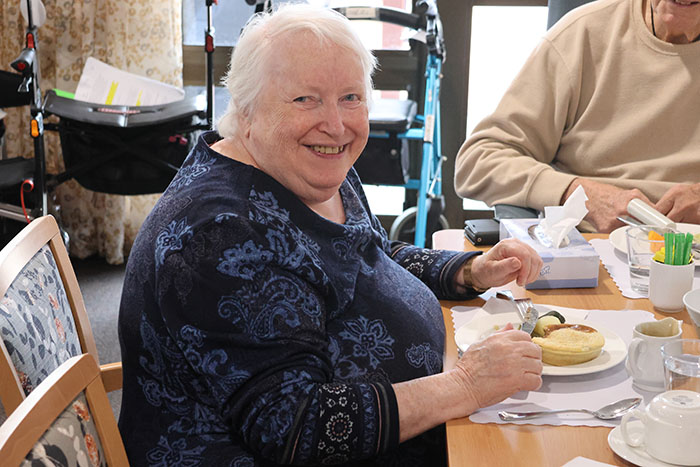
Jackie Lockhart, a Cooper House resident and former nurse (image above), is a proud advocate for her fellow residents and is happy to voice her thoughts about mealtimes.
‘Meals govern our day,’ she says, highlighting how shared mealtimes create bonds among residents. ‘Yes, we have activities but we're always having meals … And it is a good social time,'’ Jackie says with a smile.
When people are new, that’s generally how they meet people … they join the dining room, and they start laughing. That’s special.
Adapting to modified diets and innovative textures
WMQ Dining Services also prioritises the needs of residents with modified diets. The team works closely with healthcare professionals to ensure everyone receives meals that meet their clinical requirements.
Abby mentions, ‘Part of my role is to make sure residents are assessed thoroughly. Our allied health team reviews residents if they need modified textures of food. We also have an occupational therapist who determines if someone needs modified cutlery or plates.’
WMQ is also innovating with texture-modified diets, having recently undertaken a two-year project to begin reshaping pureed foods into recognisable forms to enhance the dining experience.
‘The process is that you get a pureed item and shape it to represent what it is. So, if it’s a carrot, it’s shaped like a carrot … If it’s a lamb chop, shaped like a lamb chop.’ Russell explains.
It encourages everyone to eat while still exercising the jaw and swallowing process. When you just eat purees, you don’t work out those muscles. And it’s got a psychological positive as well … We’ve tested it in homes and one of our respites. Feedback has been great.
Changing tastes: new generational requests
Russell has also noticed a big shift in what residents are requesting.
‘We’re now having to update the menu with generational changes … people are starting to be a little more open to different foods and cultures,’ he notes. ‘They’re wanting sweet and sour pork. They want a pizza night.’
Jackie wholeheartedly agrees, claiming, ‘It’s us baby boomers! We’re coming into aged care now … Plus, we've introduced smashed avocado on toast, which is a modern one. We've been adventurous.’
Food forums for resident feedback
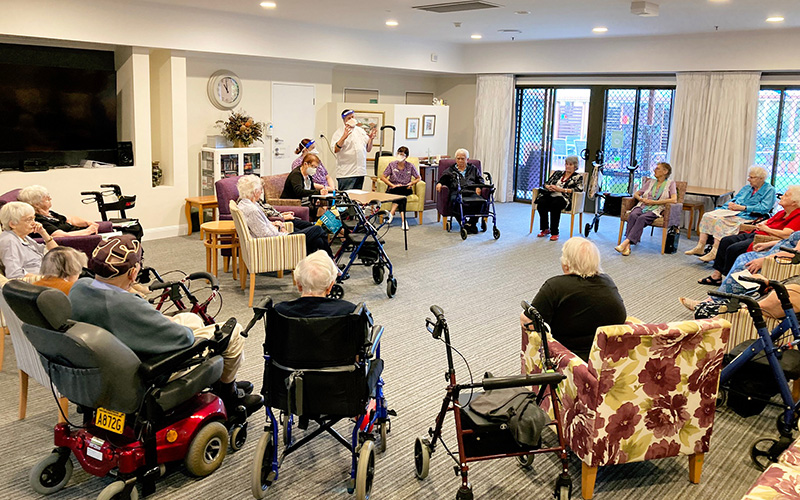
Russell meeting with residents at Cooper House aged care community to discuss meals.
Feedback is essential to our approach. Regular food forums allow residents to share their thoughts on meals, fostering a culture of collaboration and improvement. Whether it’s a new dish suggestion or a critique, every voice matters.
Jackie appreciates the food forums to openly address any concerns. ‘It means that people can come along and express themselves about the food. And it just helps to reassure them that they've got some control over what they eat … He [Russell] comes along to the forums, and gives good feedback … He's in a difficult position, and we recognise that. But we also know that it's important to give feedback on the menus.’
Resident choice meals
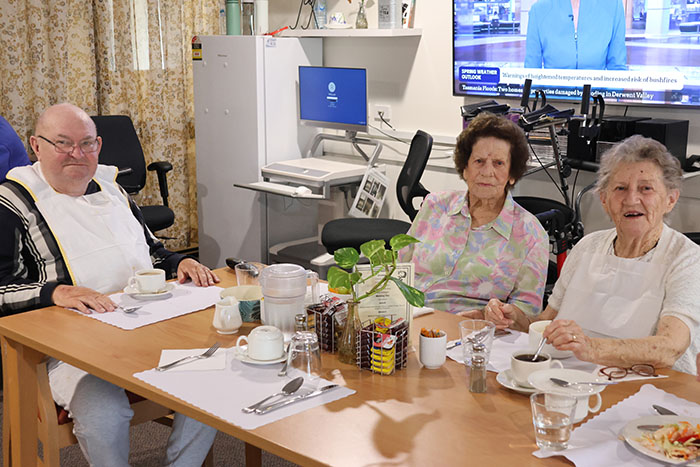
‘We also have a regular resident's choice meal,’ Russell added.
Every second Thursday of the month, we prepare a dish that's been suggested by a resident … some were very successful, and some had mixed feedback … The ones they love, I put it on the next menu.
A top priority for Russell is ensuring residents truly feel like the food is a representation of them.
‘I used to be resistant to change the gravy,’ he says, recounting how he would often hear it was too dark. ‘I had to sit back and have a think. I looked back at our resident’s history and where they've come from. They were in the military. They were in boarding houses. And that has an impact on their lives. A lighter gravy is an easy change for a happy resident.’
Continuous improvement in dining services
But of course, not all systems are perfect, a sentiment both Russell and Jackie clearly see eye-to-eye on. Russell recounted a time when a vocal Cooper House resident was unhappy with a fish dish.
‘There was a fish dish and there was this one lady who kept saying that it was terrible … And I'm thinking, what is she talking about? I’ve tried it, it’s good ... So I rang around and turns out, it had the wrong cooking instructions! A small change made it become a very well received dish.’
The resident who picked up the issue? Jackie.
‘It was boiled, and it should have been grilled. I let Russell know who investigated and it's now very tasty.’
Involving families in the dining experience
Abby says families are often also involved with menu feedback.
Some families stay and have meals in the rotunda together and it's a pleasant experience. They’re happy to see their loved ones receive nutritious meals and they can all provide feedback.
'Sometimes we do have one-on-one chats, and we’ll invite Russell to sit with the families if they have food concerns. It's good that the families can feel acknowledged and share their feedback and know we will do something about it.’
Of course, you can’t please everyone, but Russell has one last trick up his sleeve. ‘Whenever I’m at a residents meeting and if I’m in a bit of trouble, I always just ask about the cake. They love cake. The cake is always alright.’
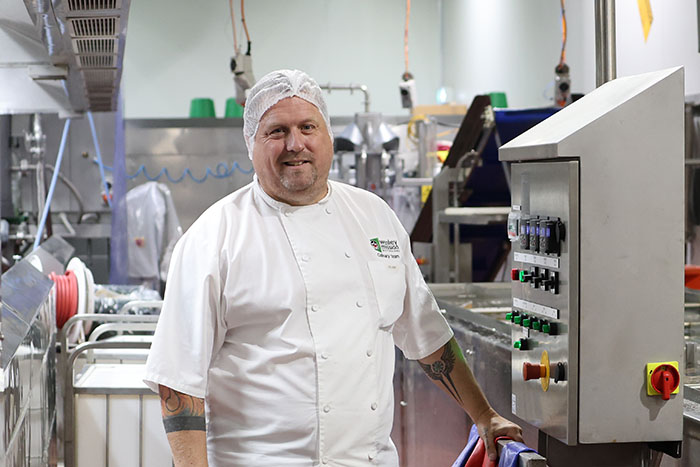
Ageing well with WMQ
Our compassionate approach is what makes us extra special!
At Wesley Mission Queensland, we pride ourselves on care that is tailored around you and your needs. Experience the difference today. Explore our website or call us on 1800 448 448.